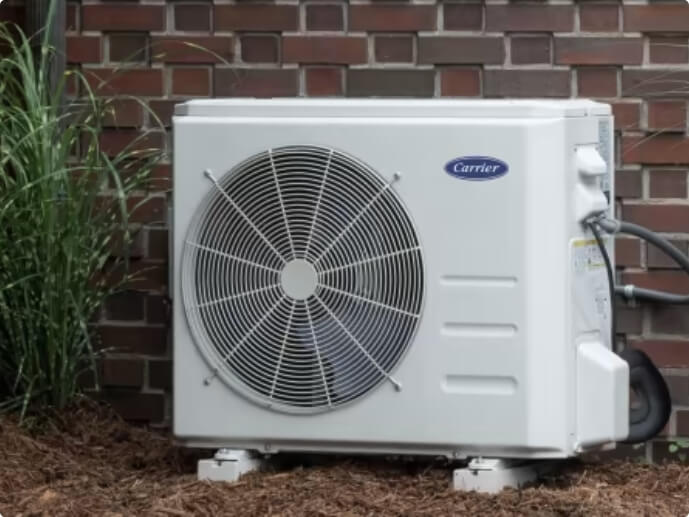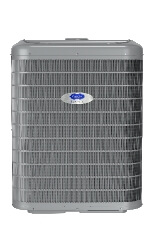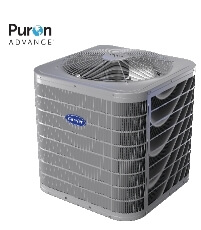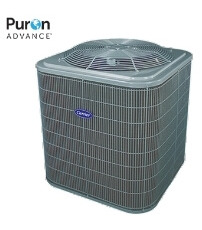As technology improves, heat pumps are quickly becoming a fantastic option for Calgary homeowners. In the past, heat pumps were designed for moderate climates where it doesn’t get too cold. However, in recent years, advanced technology has made them ideal for our varied climate when paired with a high-efficiency furnace. If you’re wondering if a heat pump is right for your home, our team can help. We can provide you with our expert recommendations based on your budget, environmental impact, and other goals.

Since heat pumps are becoming more common, you may not be as familiar with them as you may be with furnaces or air conditioners. You should look for several features in a heat pump that will offer you the best bang for your buck.
Heat pumps offer single, two-stage, or variable speeds for precise temperature control, reducing fluctuations for consistent indoor comfort.
Variable-speed and two-stage heat pumps operate quietly, with additional features like sound blankets and Silencer System II™ for reduced noise.
Two-stage and variable-speed heat pumps maintain steady humidity levels by operating longer at lower speeds, enhancing indoor comfort.
Heat pumps are assessed by HSPF2, SEER2, and EER2 ratings, indicating efficiency; geothermal options offer peak energy-efficient indoor comfort.
Heat pumps offer single, two-stage, or variable speeds for precise temperature control, reducing fluctuations for consistent indoor comfort.
Variable-speed and two-stage heat pumps operate quietly, with additional features like sound blankets and Silencer System II™ for reduced noise.
Two-stage and variable-speed heat pumps maintain steady humidity levels by operating longer at lower speeds, enhancing indoor comfort.
Heat pumps are assessed by HSPF2, SEER2, and EER2 ratings, indicating efficiency; geothermal options offer peak energy-efficient indoor comfort.
There are some common signs that your heat pump may require professional attention or need to be replaced. While we’ll always try to repair your heat pump before recommending a replacement, there are some signs that it’s time for a new heat pump. Common reasons to replace your heat pump include:


Our highest efficiency and most advanced heat pump with up to 22 SEER2 for premium energy savings with extremely quiet performance and premium comfort features.

Performance series heat pumps offer that perfect balance between budget limits you may have today and your desire for long-term energy savings.

Comfort series heat pumps are designed simply to be reliable, efficient and affordable. As a heat pump they give you the benefit of summer cooling along with cooler season heating.

Our highest efficiency and most advanced heat pump with up to 22 SEER2 for premium energy savings with extremely quiet performance and premium comfort features.

Performance series heat pumps offer that perfect balance between budget limits you may have today and your desire for long-term energy savings.

Comfort series heat pumps are designed simply to be reliable, efficient and affordable. As a heat pump they give you the benefit of summer cooling along with cooler season heating.
A heat pump is a versatile, energy-efficient system for heating and cooling a home. It works by transferring heat from the outdoors into your home during the winter and removing heat from your home to the outdoors during the summer. Unlike traditional heating systems that generate heat, heat pumps move heat, which makes them more energy-efficient, especially in moderate climates.
The average lifespan of a heat pump is about 10 to 15 years. However, this can vary based on factors such as the make and model of the heat pump, the climate in which it is used, and how well it is maintained. Regular servicing can help extend the lifespan of a heat pump.
It is recommended that your heat pump be serviced at least once a year. Regular servicing ensures that the system operates efficiently, identifies potential issues before they become major problems, and can extend the life of the unit. Servicing is often done in the spring or fall to prepare the system for the heating or cooling season.
Spring or fall is the best time to install a heat pump in your home. These periods are generally less busy for heating and cooling contractors and can provide more flexible scheduling options. Additionally, installing a heat pump during mild weather conditions is ideal as it ensures your home is equipped with efficient heating or cooling before the extreme temperatures of summer or winter set in.
The cost to install a heat pump can vary widely depending on several factors, including the type of heat pump (air source, ground source, or water source), the size of the unit needed to heat and cool your home efficiently, and any additional ductwork or modifications required. On average, installation costs can range from $4,000 to $7,000 for air-source heat pumps and significantly more for ground-source (geothermal) heat pumps.
Before installing a heat pump, consider the following:
When installing a heat pump, you can expect: